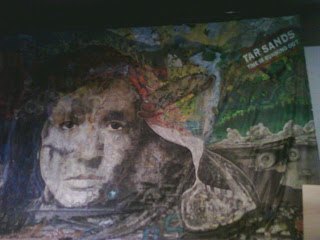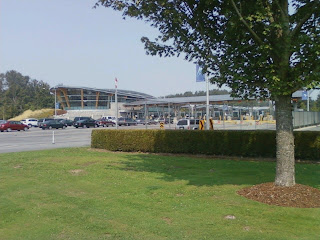 I'm in Seattle to read at Green Lake Library, which really does look out over a lake. This dry SoCal boy can't stop looking at all the Pacific Northwest's water. It rained the day of my reading, but the temperature was comfortable, so people just walked amongst the raindrops. The gray clouds flattened out the color, making Green Lake gray, nearly matching the sky. It was the little splashes on the surface that made the lake a bit lighter. Light in all directions: down, then up.
I'm in Seattle to read at Green Lake Library, which really does look out over a lake. This dry SoCal boy can't stop looking at all the Pacific Northwest's water. It rained the day of my reading, but the temperature was comfortable, so people just walked amongst the raindrops. The gray clouds flattened out the color, making Green Lake gray, nearly matching the sky. It was the little splashes on the surface that made the lake a bit lighter. Light in all directions: down, then up.I've been playing "Flow Between Storms" on this tour, but at the Green Lake Library, I got to play it in the rain, so the song got ambient percussion to accompany it. Back at Cottage Grove in Vancouver, it was the old wood of Les Clarke's guitar that gave the song something extra; at Green Lake it was the rain. For the musician, there is a release when a song resonates with the song you're playing...or you're resonating with the world. Sound in all directions: inside out or outside in.
Horses were big in my childhood and make appearances in "Lost Dog," "Suburban Cowboys," "The Reagan Memorial Poem," "Commie Balktalk" and "Fire Mind." Here's video of "Fire Mind" that Adam Turner shot in SoCal.
October firestorm rolls west overthe rim of Eden Creek Canyon.Smoke from hundreds of homes, barns,photos and lives of twenty-one neighborsroils in incense of white sagesacred to tribal people on two reservationsnow ablaze, their outlawed spring burnsresurrected brutally in autumn.Recognizing the ghost of smoke releases meto accept losing everything so that whenour house emerges after fire, only planks ofpatio aflame, I resist calling it “blessing.”That night, hot spots burn around canyon,the only lights there until neighbors rebuild—power lines ignited like fuses,exploding suburbs in the brush—and above spot fires, starscalling back thousands of others, dark insisting.The day after fire, I walk the rim,first time in twenty years. Consoling neighborsI’d never met as they sift ashes over concrete foundations,I trespass freely to the east,catch five goats, two pigs, a cat withburnt paws. I shoot two horses without hooves,their lungs singed, the blood they breathedthe only moisture within miles. I shootinto another mind that becomes mine.The fire: the rifle, and my hand: the bullet.I follow a trajectory heartless as flames over so many.Next week at a funeral, people flow through my arms.I survive to hold them, open my cage of ribs.Their sobs become my heartbeat, their tears: my blood.My warmth from pressure of motion,the same heat Santa Anas raise crossing the Mojave.The town weeps itself dry while I wonder,where are my tears of survival?Each March, I burn brush. The flame atthe matchtip, the shape of an orange tear.Neighbors watch. Every spring a warning.








